Victim’s Bias – The Mistaken Belief That Only Other Victims Understand And Can Help!
Victim’s Bias Introduction
Victim’s Bias is a cognitive bias – the belief that only other victims who have experienced the same type of crime can possibly understand what a victim has experienced. That somehow other victims become experts and are able to provide advice about victimization, criminology, and recovery psychology, even though they are only experts in the experience they had which is often not comparable to the other victims’ experience.
It is often coupled with other biases, such as the Confirmation Bias leading victims to believe that another victim experienced exactly the same even though the details may be quite different.
This can lead to serious errors of judgment after a crime by seeking out nonprofessionals that do not understand the need for grief processing, trauma counseling, or the recovery process.
The fact is the other victims can provide encouragement and support, but they are NOT the only ones that understand the victim’s experience. Tragically, this bias causes at least a third of scam victims to avoid getting the professional help they need.
To learn more about cognitive biases and the negative effects that they have visit: Cognitive Biases Catalog
Victim’s Bias Appeal
Why is victim’s bias so compelling? Crime victims, specifically scam or financial fraud victims often have a bias that only other victims can understand what they went through.
This is because crime victimization can be a very isolating and traumatic experience. Victims may feel like they are the only ones who have ever experienced what they have, and they may not feel comfortable talking about it with people who have not been through it themselves.
There are a few reasons why crime victims feel this way.
- First, crime victimization can be very personal and violating. Victims may feel like they have been stripped of their sense of safety and security, and they do not feel comfortable sharing their story with people who have not been through the same thing.
- Second, crime victimization can be very confusing and disorienting. Victims may not understand why they were targeted, and they may be struggling to come to terms with what happened. They may feel like they are going crazy, and they may not feel like anyone else can understand what they are going through.
- Third, crime victimization can be very isolating. Victims may feel like they are the only ones who have ever been through what they have, and they may not feel like they can talk to anyone about it. They may feel like they are being judged or blamed, and they may not feel like anyone can truly understand what they are going through.
As a result of these factors, crime victims often feel like only other victims can understand what they went through. This is why it is so important for crime victims to have access to support groups and other resources where they can connect with other people who have been through similar experiences. These resources can provide victims with a safe space to talk about their experiences, and they can help victims to feel less alone and more understood.
The Danger of Victim’s Bias
Victim’s bias is the tendency for people to believe that only other victims can understand what they have been through. This can be a dangerous bias for scam victims, as it can lead them to seek help from incompetent or even harmful “experts.”
There are many incompetent so-called experts who claim to know how to help scam victims recover. These experts may offer services such as emotional support, amateur-run support groups, financial recovery, or legal help. However, many of these experts are not qualified to provide these services, and they may actually make the victim’s situation worse.
Some of these experts may be suffering from Savior Syndrome. Savior Syndrome is a condition in which someone believes that they are uniquely qualified to save or help others. People with Savior Syndrome often have a need to feel powerful and in control, and they may exploit scam victims in order to satisfy their own needs.
These experts may use manipulative and controlling techniques to gain the trust of scam victims. They may make promises that they cannot keep, or they may pressure victims to make decisions that are not in their best interests. In some cases, these experts may even emotionally abuse scam victims.
Scam victims who are vulnerable to victim’s bias are more likely to fall prey to these incompetent or harmful “experts.” This is why it is so important for scam victims to be careful about who they trust. If you are a scam victim, it is important to do your research and only seek help from reputable nonprofit organizations and experts.
To find real help you can contact your State or Province’s Attorney General’s Office/Prosecutor’s Office and ask for their victims’ assistance or advocacy department. Then ask for a victims’ assistance or services provider they know or recommend. You can also find them on VictimConnect.org Never accept help from just anyone because they claim to be an expert, verify who they are – always!
Here are some tips for scam victims to avoid incompetent or harmful “experts”:
- Do your research. Before you seek help from anyone, be sure to do your research and make sure that they are qualified to provide the services you need.
- Get multiple opinions. If you are considering working with an expert, get multiple opinions from different people. This will help you to avoid being taken advantage of. You can get help from professional licensed psychologists, nonprofit support organizations, and government agencies.
- Walk away. If something feels off, it probably is. Don’t be afraid to walk away from a situation that doesn’t feel right.
It is also important for scam victims to remember that they are not alone. There are many resources available to help them recover from their experience without trusting just anyone. These resources can provide victims with emotional support, psychological counseling, financial assistance, and legal help.
Are You a Victim?
If you are a crime victim, it is important to remember that you are not alone. There are many people who care about you and want to help. Please reach out for support if you need it.
Here are more tips on how crime victims can avoid incompetent experts and find true professionals to help them:
- Get recommendations from trusted sources. Ask your friends, family, or doctor for recommendations for reputable experts. You can also check with your local victim’s assistance program or law enforcement agency.
- Check the expert’s credentials. Make sure that the expert is licensed and certified to provide the services you need or is a registered nonprofit organization. You can verify professionals’ credentials by contacting their governing professional association or licensing board.
- Get everything in writing. Before you agree to work with an expert, get everything in writing, including their fees, services, and expectations. This will help to protect you in case there are any problems down the road. Please note that SCARS provides all of its victims’ services for free.
- Beware of any promises that seem too good to be true. If an expert is making promises that seem too good to be true, it’s probably a scam or at best a lie – this includes that they can get your scammer/criminal arrested or recover the money that you lost. Be wary of any experts who guarantee that they can get you your money back or that they can solve your problem overnight.
- Trust your gut. If you feel uncomfortable with an expert or their services, don’t feel obligated to work with them. There are many other experts out there who can help you. Just remember thought, that after a crime, your gut is not going to be working too well, so be very cautious!
There are many resources available to help them find the right expert. These resources can provide victims with information and support, and they can help victims to avoid being taken advantage of.
If you are a crime victim, please reach out for help. There are people who care about you and want to help you recover.
Here are some resources that can help crime victims find reputable experts:
- Victim Connect is a global directory of victims’ services providers that have been verified (it includes SCARS) at VictimConnect.org
- The National Center for Victims of Crime: VictimsOfCrime.org
- The National Association of Crime Victim Compensation Boards: NACVCB.org
- The National Alliance on Mental Illness: NAMI.org
See below for resources that can help you!
SCARS Resources:
- Getting Started Right: ScamVictimsSupport.org
- Sextortion Scam Victims: Sextortion Victims Support – The Essentials (scamvictimssupport.org)
- For New Victims of Relationship Scams newvictim.AgainstScams.org
- Subscribe to SCARS Newsletter newsletter.againstscams.org
- Sign up for SCARS professional support & recovery groups, visit support.AgainstScams.org
- Join our Scam Survivors United Chat & Discussion Group facebook.com/groups/scam.survivors.united
- Find competent trauma counselors or therapists, visit counseling.AgainstScams.org
- Become a SCARS Member and get free counseling benefits, visit membership.AgainstScams.org
- Report each and every crime, learn how to at reporting.AgainstScams.org
- Learn more about Scams & Scammers at RomanceScamsNOW.com and ScamsNOW.com
- Scammer photos ScammerPhotos.com
- SCARS Videos youtube.AgainstScams.org
- Self-Help Books for Scam Victims are at shop.AgainstScams.org
- Donate to SCARS and help us help others at donate.AgainstScams.org
- Worldwide Crisis Hotlines: https://blog.opencounseling.com/suicide-hotlines/
Other Cyber Resources
- Block Scam Domains: Quad9.net
- Global Cyber Alliance ACT Cybersecurity Tool Website: Actionable Cybersecurity Tools (ACT) (globalcyberalliance.org) https://act.globalcyberalliance.org/index.php/Actionable_Cybersecurity_Tools_(ACT)_-_Simplified_Cybersecurity_Protection
- Wizer Cybersecurity Training – Free Security Awareness Training, Phishing Simulation and Gamification (wizer-training.com)
More:
- Victim Connect is a global directory of victims’ services providers that have been verified (it includes SCARS) at VictimConnect.org
- The National Center for Victims of Crime: VictimsOfCrime.org
- The National Association of Crime Victim Compensation Boards: NACVCB.org
- The National Alliance on Mental Illness: NAMI.org
- Recovering from Scams (romancescamsnow.com)
- Psychology of Scams (romancescamsnow.com)
- Confirmation Bias: (romancescamsnow.com)
- Cognitive Biases Catalog (romancescamsnow.com)
- Victimology – What Is It? (scamsnow.com)
- The Crab Mentality and Amateur Anti-Scam Support Groups (scamsnow.com)
- Magical Thinking – How Biased & Delusional Thinking Enslaves Scam Victims (scamsnow.com)
- What Really Are Vulnerabilities That Lead To Scams? (scamsnow.com)
-/ 30 /-
What do you think about this?
Please share your thoughts in a comment below!
Do You Need Support?
Get It Now!
SCARS provides the leading Support & Recovery program for relationship scam victims – completely FREE!
Our managed peer support groups allow victims to talk to other survivors and recover in the most experienced environment possible, for as long as they need. Recovery takes as long as it takes – we put no limits on our support!
SCARS is the most trusted support & education provider in the world. Our team is certified in trauma-informed care, grief counseling, and so much more!
To apply to join our groups visit support.AgainstScams.org
We also offer separate support groups for family & friends too.
Become a
SCARS STAR™ Member
SCARS offers memberships in our STAR program, which includes many benefits for a very low annual membership fee!
SCARS STAR Membership benefits include:
- FREE Counseling or Therapy Benefit from our partner BetterHelp.com
- Exclusive members-only content & publications
- Discounts on SCARS Self-Help Books Save
- And more!
To learn more about the SCARS STAR Membership visit membership.AgainstScams.org
To become a SCARS STAR Member right now visit join.AgainstScams.org
To Learn More Also Look At Our Article Catalogs
Scam & Crime Types
More SCARS
- ScamsNOW Magazine – ScamsNOW.com
- ContraEstafas.org
- ScammerPhotos.com
- AnyScam.com – reporting
- AgainstScams.org – SCARS Corporate Website
- SCARS YouTube Video Channel


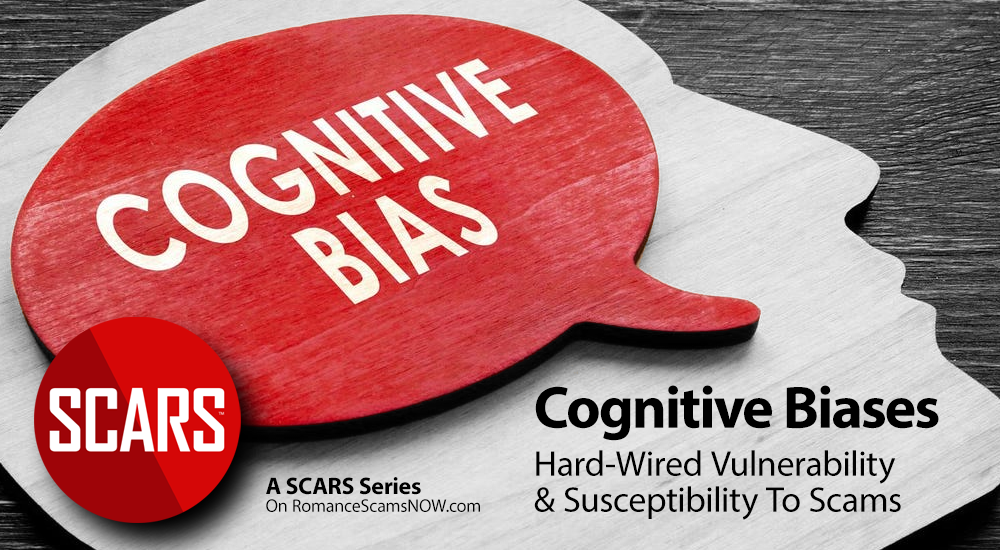
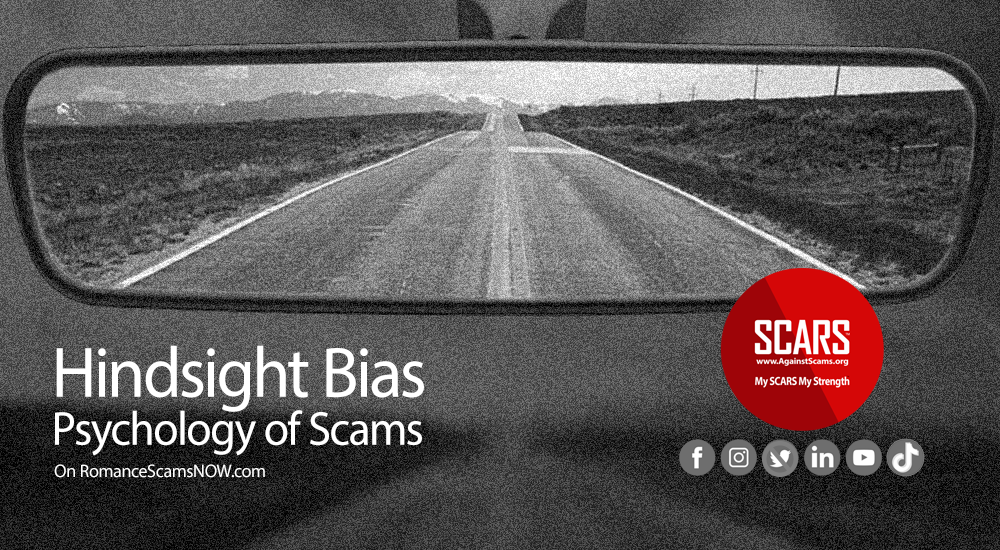
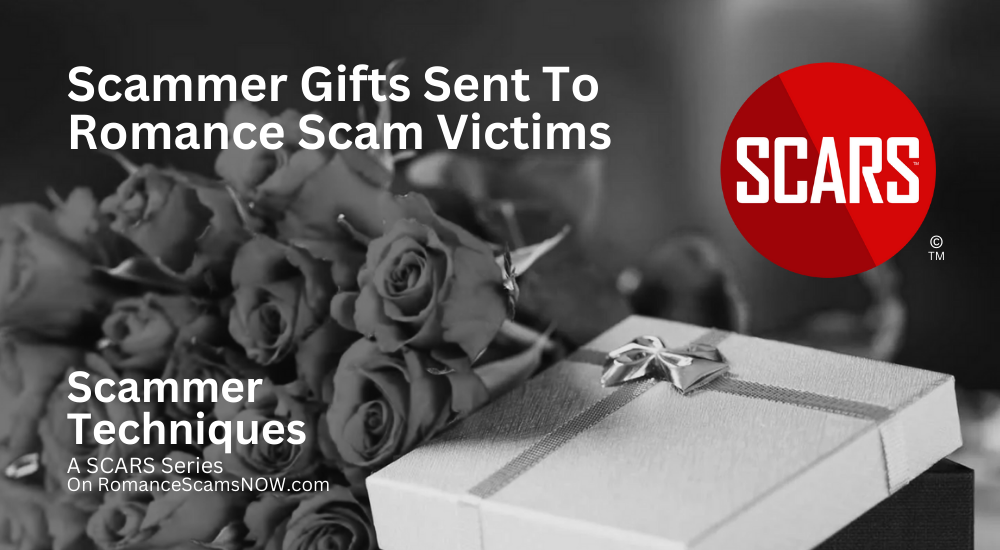
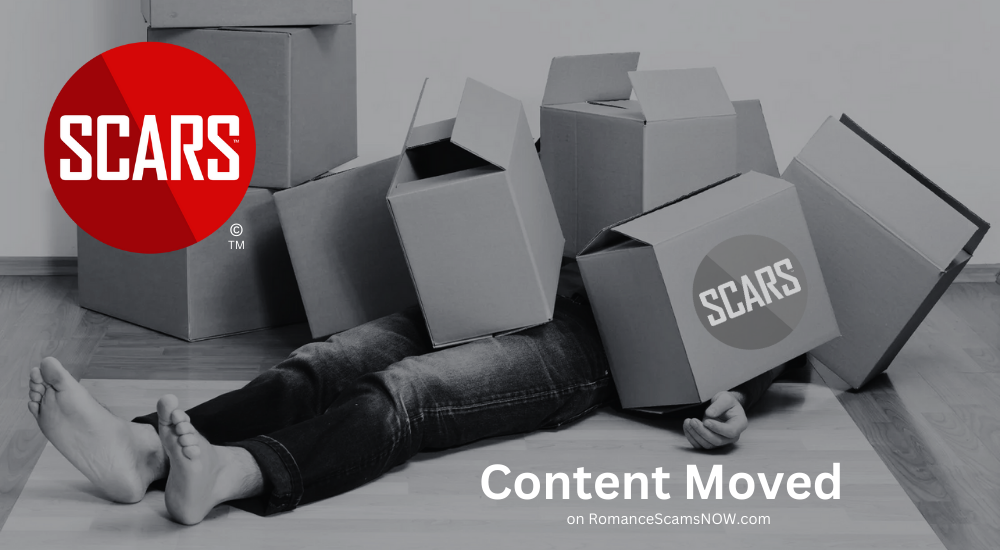
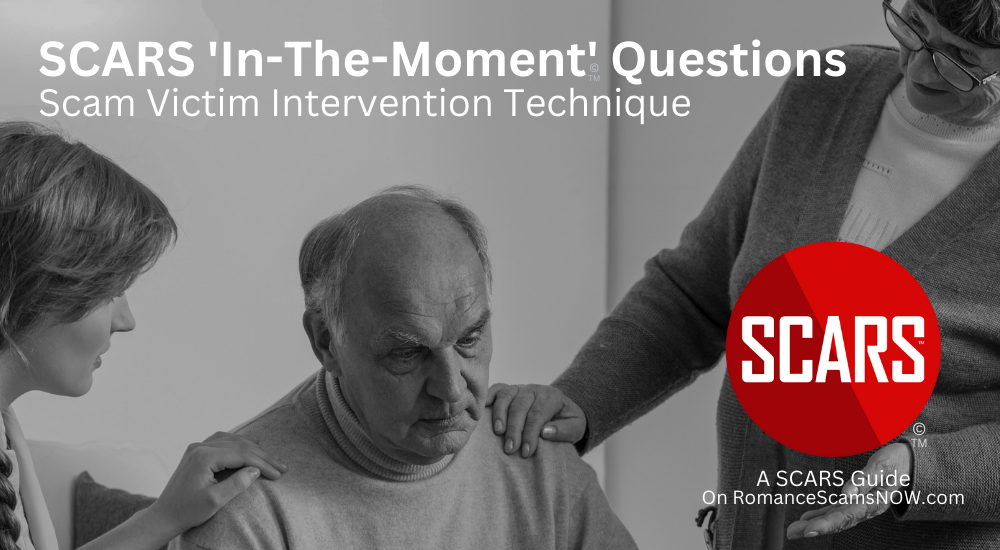
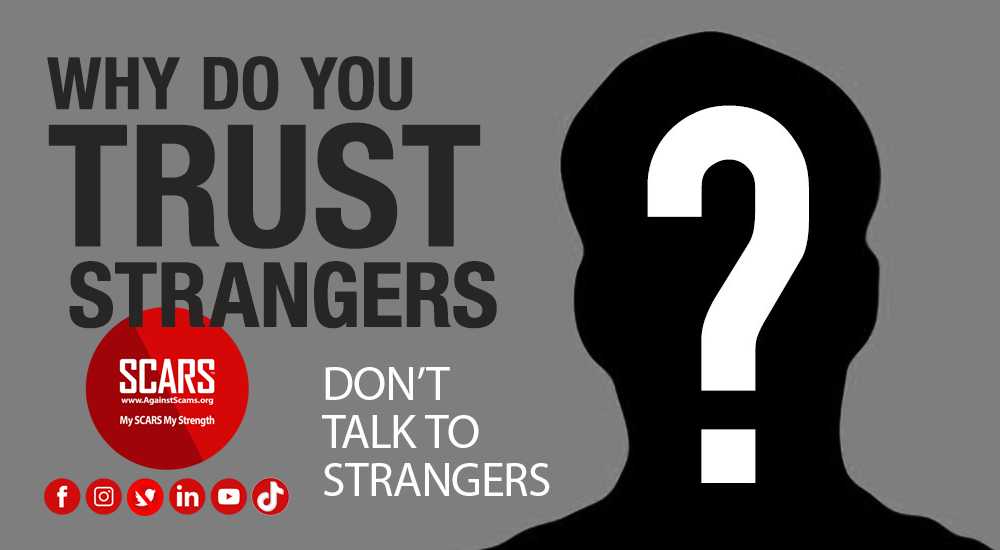










Leave A Comment